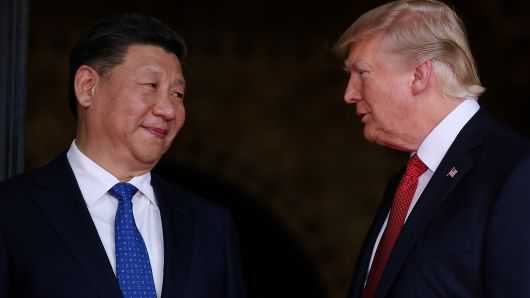Trump's pressure on trade may force China to act faster on reforms, analysts say
11 August, 2018

U.S. trade pressure on China could push Beijing to speed up efforts to restructure its economy, some local analysts say.
President Donald Trump has threatened tariffs on more than $200 billion worth of Chinese goods. After already implementing duties on $34 billion worth of imports, his trade office is planning to impose tariffs on an additional $16 billion in Chinese goods on Aug. 23. China's Ministry of Commerce has responded in kind by announcing two phases of tariffs on the same amount of U.S. goods, with the latest salvo hitting Wednesday night local time.
But as Beijing faces a slowing economy, high debt levels and a slumping stock market, the pressure is on to maintain stable, and healthy growth.
In response to Trump's tough trade stance, the Chinese government will likely need to move more quickly than planned on structural reforms in areas such as state-owned enterprises, taxation, and income and wealth distribution, according to Hong Liang, chief economist at Beijing-based investment bank China International Capital Corporation.
Some of the latest official announcements indicate officials are still intent on pushing forward with changes in those areas.
The State Council, China's top administrative authority, announced last month that Vice Premier Liu He — who is also a key negotiator for trade talks — will head a group leading state-owned enterprise improvements. Ongoing reforms include an effort to allow some private investment into state-owned firms and a plan first announced last year to transfer 10 percent of state-owned shares into pension funds.
State-owned enterprises hold a large portion of Chinese assets, but tend to be inefficient, debt-ridden and heavily concentrated in the manufacturing industries on which Beijing is trying to reduce economic reliance.
China will also reduce the tax burden on businesses, according to a July 23 statement following a State Council meeting chaired by Premier Li Keqiang. That followed his announcement in March for corporate and individual tax reductions of more than 800 billion yuan in 2018, according to a report from the state-run news agency Xinhua.
Pressure from Trump on trade could result in substantial progress on reducing the tax burden, while also increasing the pace of China's opening up, according to Lu Zhang, Beijing-based economist at investment research firm CEBM.
The nation's top leaders did not directly acknowledge the trade tensions in a statement released last week following a meeting of the Politburo, a top decision-making body. They emphasized, however, the need to maintain stable economic development through fiscal policy, while still reducing reliance on debt.
The Shanghai composite hit bear market territory in June on worries about regulatory tightening that may slow growth, and Trump's tariffs. But stocks have steadied this week amid hopes of government stimulus. The index traded more than 1.5 percent higher Thursday, down just 15.7 percent for the year so far.
Despite the predictions of a renewed focus on reform, it's unclear whether Beijing will be able to speed up its economic policy changes, which can often take years.
The government will likely focus on fiscal spending to maintain growth, while the ongoing timetable for structural reform won't be affected, said Arthur Kroeber, head of research at China-focused economic research firm Gavekal Dragonomics.
The bigger concern for Beijing is whether Trump will forge ahead with 25 percent tariffs on $200 billion worth of Chinese goods. That could hit China's GDP by one percentage point or more, Kroeber said.
